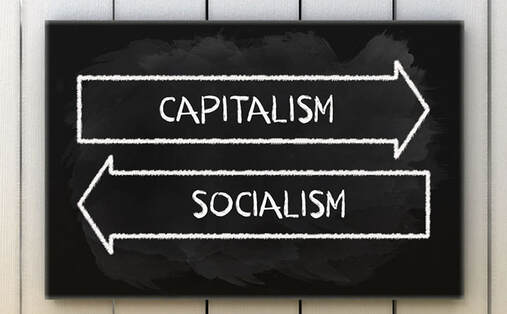Try running your household budget by spending more than you make. How long could you manage to play that game before your mortgage, utility and credit card companies come knocking on the door to collect past due payments? Hard times come upon many, but at the root of the American spirit is hard work and resiliency. It’s about when you get knocked down, you fight to get back up, dust yourself off and go win another day. Unfortunately, that spirit seems to be under attack. Why?
We are now at a crossroad of two diametrically opposed economic philosophies. A battle of epic proportion is playing out right before our very eyes in school board meetings, congress and backyard barbeques. The philosophy that prevails in the end will set the direction of the country for years to come.
The opposing philosophies are (1) An economy run by private ownership and the exchange of goods and services in a market where prices are determined by competition. It promotes innovation, hard work and distributes money in proportion to the value added to the economy. Personal responsibility is a key tenant of this philosophy. (2) An economy controlled by a centralized body that distributes goods and services based on their determination. This philosophy promotes results based on giving to all by controlling distribution of money from a centralized place rather than competition determining results. These two philosophies cannot co-exist and will create turmoil until only one prevails.
Fiscal and monetary policies are influenced by the philosophy chosen. These policies will have a direct impact on the economy and your personal finances. It will determine interest rates, supply chains and your purchasing power. The velocity of money is a principal that provides a lens into the results of current policies. It is a measurement of the rate at which money is exchanged in an economy. In other words, the more times goods and services are exchanged, the higher the velocity and therefore the more value that currency provides to the economy.
Due to the pandemic, the Federal Reserve is on track to increase the money supply by as much as an additional 65% in 2021. Since the start of the pandemic, the money supply has already increased about 74% from pre-pandemic levels (federalreserve.gov). This is a concern because this money was not created through the exchange of goods and services it was simply printed. Therefore, the velocity of money has slowed dramatically and puts the value of the currency at risk of decline. The consequences are beginning to be felt through higher inflation and the possibility of a devalued currency may be on the horizon. If purchasing power decreases, that puts a strain on working Americans as well as adds longevity risk to portfolios for retirees.
To summarize the moment in time we are living, a sermon by Adrian Rogers back in the 1980s seems more relevant than ever:
“You cannot legislate the poor into freedom by legislating the wealthy out of freedom. What one person receives without working for, another person must work for without receiving. The government cannot give to anybody anything that the government does not first take from somebody else. When half of the people get the idea that they do not have to work because the other half is going to take care of them, and when the other half gets the idea that it does no good to work because somebody else is going to get what they work for, that my dear friend, is about the end of any nation. You cannot multiply wealth by diving it.”
As we continue the debate and direction of our country, make sure you are reviewing your financial game plan to make sure it will provide for you and your family now and in the future regardless of philosophy or policies chosen. Talk with a Financial Coach to get your questions answered and have confidence in your financial decisions. Stay informed, engage in respectful debate and most importantly be thankful to have the freedoms we enjoy every day.

